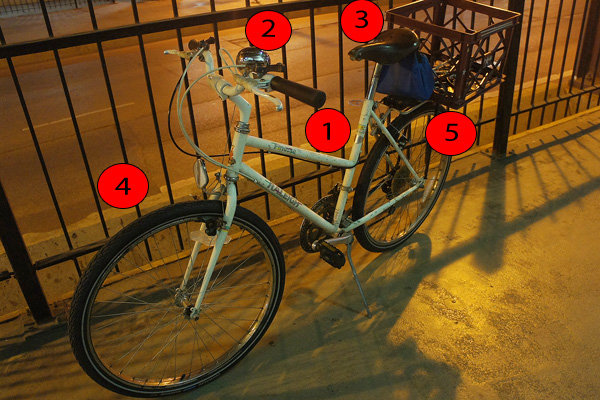
This month Chicago has a bit of a biking package, with a look into Chicago's fastest, most intense bike clubs; the anatomy of a $21,776 bicycle ("Parlee Z-O customized frame set with carbon fiber tubes," 2.2 pounds, $8,200), and some of the nicest accessories you can find (like a $230 bike helmet).
It's a fun look into the extremes of bike culture in Chicago, but it's a bit foreign to me as someone used to beaters. I'm not immune to the appeal of nice bikes—some day I'd like to get a bike from Six-Eleven, built in Roanoke, where I grew up, by recent Chicago expat Aaron Dykstra. But they start at $2,350—or about two months' rent for me.
And I've already got a perfectly functional commuter that gets me the four miles to work in about 25 minutes at an average of ten miles an hour—I stop at lights—which is usually faster than the bus. It's sometimes twice as fast. It weighs about 30 pounds, but unlike the featherweight $21k bike, this one hauls groceries. And it cost about $150.
Which also puts Chicago's new bike-share program in some context. None of my colleagues think anyone will use it, but at $75 for a year, it could be a deal—it's half what a hand-me-down modified for my needs cost, it doesn't require maintenance or storage, it's cheaper than one month of unlimited CTA use, and it's comparably fast or faster.
While I'm looking forward to trying out Divvy, it doesn't make sense for me, because I live about a mile from the nearest planned Divvy dock. So for me—and, probably, a lot of Chicagoans—biking means riding a beater. If you don't mind uncool (but thief-deterrent) looks, it's pretty cheap to get started as a bike commuter. If you do it like I did, here's what you'll invest in:
1. Raleigh Finesse Women's Trail Bike, $0. The bike itself was a hand-me-down from my mother-in-law, a Raleigh Finesse. Google barely acknowledges that model exists, so I have no idea how much it originally cost or how to price it; free to $150 seems to be the range. Point being: an older, decently made steel "mountain" bike can be had for a song and makes a perfectly acceptable commuter bikes that thieves will have little interest in. Right now it's locked up with six other bikes, and mine is the next to last that I'd steal.
2. Big ding-dong bell, $12. The biggest they had at Rapid Transit. More of an accessory, but a useful one, and I think it's cool.
3. Brooks saddle, $0. I'm cheating a bit with this one, but that's what it cost me. A friend of mine moved and left me his bike, which was lovely, but too big; I almost killed myself riding it to Working Bikes to donate it. A comparable new Brooks B17 is about $100; you could probably save $20-$50 on a used one. What I really want is a spring-loaded Brooks B67, but that would cost almost as much everything else cost.
4. Schwalbe Marathon tires, $90; Tektro brakes, $50. The tires were my one splurge; you can get tires for a quarter as much… but I also haven't had a flat since I bought them. Given the potholes and glass I travel over every day, it's been worth it. They're also Steven Vance-approved. The brakes were from the whatever-works tier at Rapid Transit, and they stop my bike; i'm told they can be improved with high-end but relatively inexpensive ($15-$20) pads.
5. Used saddlebag, $5; used rear rack, $5; crate, was lying around. Working Bikes has wonderfully cheap piles of used bags and rear racks. The rear rack has been a boon—I lashed a file crate I've been carrying around since college to it with bungee cords (which I need to replace with zip ties). I've tried panniers (broke), messenger bags (can't get used to how they lay), and backpacks (unpleasant during the summer); with the crate I can use whatever bag I want plus heavier or more awkward stuff.
What it needs: fenders. I'm tempted to splurge on VeloOrange fenders—available, last time I checked, at Comrade Cycles—because despite the evidence to the contrary, I am a bit vain.


